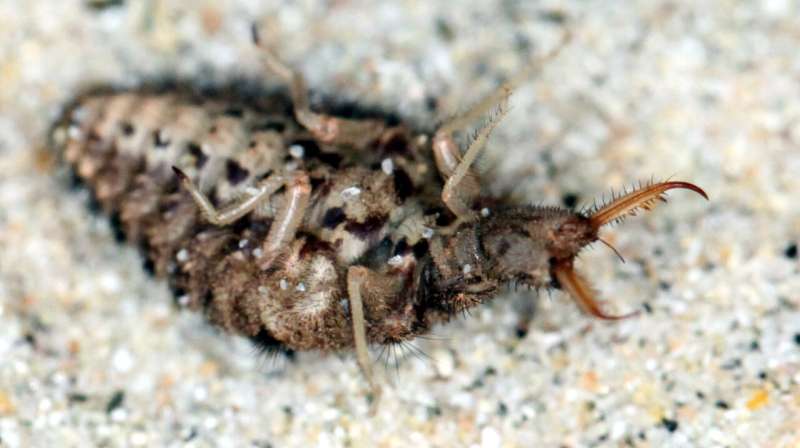
Many animals feign death to try to escape their predators, with some individuals in prey species remaining motionless, if in danger, for extended lengths of time.
Charles Darwin recorded a beetle that remained stationary for 23 minutes—however the University of Bristol has documented an individual antlion larvae pretending to be dead for an astonishing 61 minutes. Of equal importance, the amount of time that an individual remains motionless is not only long but unpredictable. This means that a predator will be unable to predict when a potential prey item will move again, attract attention, and become a meal.
Predators are hungry and cannot wait indefinitely. Similarly, prey may be losing opportunities to get on with their lives if they remain motionless for too long. Thus, death-feigning might best be thought of as part of a deadly game of hide and seek in which prey might gain most by feigning death if alternative victims are readily available.
The study, published today in science journal Biology Letters, involved evaluating the benefits of death-feigning in terms of a predator visiting small populations of conspicuous prey. Researchers used computer simulations that utilise the marginal value theorem, a classical model in optimization.
Lead author of the paper Professor Nigel R. Franks from the University of Bristol's School of Biological Sciences, said: "Imagine you are in a garden full of identical soft fruit bushes. You go to the first bush. Initially collecting and consuming fruit is fast and easy, but as you strip the bush finding more fruit gets harder and harder and more time consuming.
"At some stage, you should decide to go to another bush and begin again. You are greedy and you want to eat as many fruit as quickly as possible. The marginal value theorem would tell you how long to spend at each bush given that time will also be lost moving to the next bush.
"We use this approach to consider a small bird visiting patches of conspicuous antlion pits and show that antlion larvae that waste some of the predator's time, by 'playing dead' if they are dropped, change the game significantly. In a sense, they encourage the predator to search elsewhere."
The modelling suggests that antlion larvae would not gain significantly if they remained motionless for even longer than they actually do. This suggests that in this arms race between predators and prey, death-feigning has been prolonged to such an extent that it can hardly be bettered.
Professor Franks added: "Thus, playing dead is rather like a conjuring trick. Magicians distract an audience from seeing their sleights of hand by encouraging them to look elsewhere. Just so with the antlion larvae playing dead—the predator looks elsewhere. Playing dead seems to be a very good way to stay alive."
Explore further
Citation: Animals fake death for long periods to escape predators (2021, March 2) retrieved 3 March 2021 from https://ift.tt/3rdLoyp
This document is subject to copyright. Apart from any fair dealing for the purpose of private study or research, no part may be reproduced without the written permission. The content is provided for information purposes only.
https://ift.tt/3bSPUfu
Science
No comments:
Post a Comment